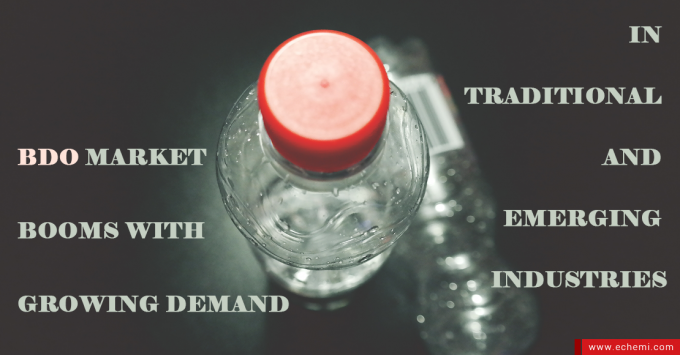Urethane Blog
Butanediol in China
June 13, 2023
BDO Market Booms with Growing Demand in Traditional and Emerging Industries
ECHEMI2023-06-12
1,4-butanediol (BDO) is an influential organic and fine chemical raw material, widely used in textile, chemical and other fields. Demand for BDO has formed a significant driving force in recent years with the expansion of applications in emerging fields such as biodegradable plastics and lithium batteries, as well as the recovery of traditional downstream industries such as spandex and PBT plastics.

According to SteelHome, the BDO market is currently extremely hot, with prices rising sharply. The benchmark price of BDO in the East China market has exceeded 11000-11100 yuan/ton, with a growth to the past week. According to research by Shenwan Hongyuan Securities, China’s apparent BDO consumption is expected to reach about 4.47 million tons per year by 2025, and the compound annual growth rate of BDO demand from 2020 to 2025 will be 26.5 percent.
BDO’s traditional application areas are primarily spandex and PBT engineered plastics, with BDO’s downstream applications in the spandex industry chain and PBT engineered plastics reaching 51% and 26% respectively. The spandex market is extremely hot, with product prices up nearly 200 percent, as demand for textiles and clothing recovers and export orders rise. The PBT plastics sector is also showing a clear trend of growth, with increasing applications in new energy vehicles and charging devices.
In addition to traditional application areas, BDO is rapidly expanding its applications in emerging areas such as biodegradable plastics and lithium batteries. With the frequent introduction of domestic plastic reduction policies, the demand for biodegradable plastics is about to enter a period of explosive growth, and PBAT is expected to lead the way in the agricultural plastic film and packaging materials and other biodegradable plastic markets with well-established production technologies and high cost-effectiveness. As a major feedstock for PBAT, PBAT is expected to generate approximately 2.5 million tonnes/year of new demand for BDO by 2025. At the same time, BDO is an essential raw material in the hottest lithium battery industry chain, and its downstream NMP is an important solvent in the production process of lithium battery cathodes, as well as a cleaning agent for semiconductors and integrated circuits.
Due to the long-term low BDO product prices, companies can only barely maintain a break-even point, and the industry’s sluggish business environment severely hinders new capital expenditures. Currently, the d Chinese annual production capacity of BDO is about 1.45 million tons, and the demand gap exceeds 200,000 tons. Only two A-share listed companies, Zhongtai Chemical and Shaanxi Black Cat, have BDO production capacity, with a combined annual capacity of only 330,000 tons. The huge gap between supply and demand has attracted a group of domestic companies to ramp up production on a regular basis. More than 1.5 million tons of new BDO capacity are currently planned in China, but the construction of BDO capacity usually takes about two years and there is a certain commissioning period after completion to achieve stable production. The fastest new capacity will gradually enter the production release period in the second half of 2022. Many industry insiders believe that the mismatch between new capacity and downstream demand growth will keep this cycle of BDO shortages going for more than two years, and that the BDO business environment will continue to improve as a result.
Recently, the world’s largest BDO project with an annual production capacity of 900,000 tons was settled in Fujian. The project will help boost China’s new energy and environmental protection industries by using the large amount of hydrogen produced as a by-product of propane dehydrogenation to produce BDO, a new chemical material that can be used to produce lithium batteries, high-end spandex, fully biodegradable plastics and other products. The move is an important boost for China’s plasticization industry and will help promote the transformation and upgrading of the country’s chemical industry, as well as the development of new energy and environmental protection industries.
https://www.echemi.com/cms/1416474.html
Polybutylene adipate terephthalate
From Wikipedia, the free encyclopedia
PBAT (short for polybutylene adipate terephthalate) is a biodegradable random copolymer, specifically a copolyester of adipic acid, 1,4-butanediol and terephthalic acid (from dimethyl terephthalate). PBAT is produced by many different manufacturers and may be known by the brand names ecoflex, Wango, Ecoworld, Eastar Bio, and Origo-Bi. It is also called poly(butylene adipate-co-terephthalate) and sometimes polybutyrate-adipate-terephthalate[1] (a misnomer) or even just “polybutyrate”.[2] It is generally marketed as a fully biodegradable alternative to low-density polyethylene, having many similar properties including flexibility and resilience, allowing it to be used for many similar uses such as plastic bags and wraps.[3] It is depicted as a block co-polymer here due to the common synthetic method of first synthesizing two copolymer blocks and then combining them. However, it is important to note that the actual structure of the polymer is a random co-polymer of the blocks shown.
Read more here: https://en.wikipedia.org/wiki/Polybutylene_adipate_terephthalate
 Sign Up for Email Updates
Sign Up for Email Updates
 Everchem Updates Archive
Everchem Updates Archive
Recent News
July 11, 2024
July 9, 2024
July 9, 2024
